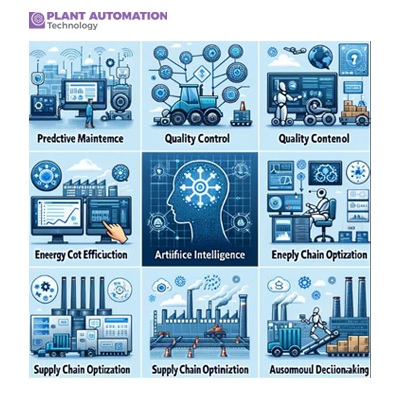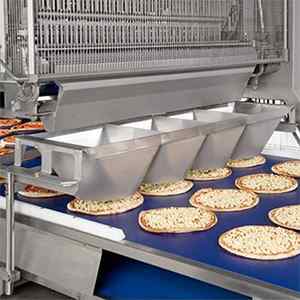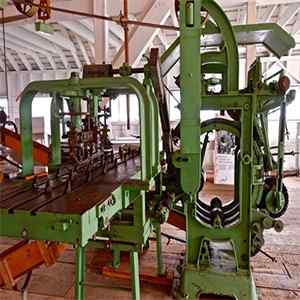The Role of Artificial Intelligence in Enhancing Manufacturing Efficiency

Introduction
Artificial intelligence, as one of the key trends in the highly dynamic world of modern industry, plays the role of a driving force providing new characteristics of efficiency. The adaptation of intelligent technologies in manufacturing environments is changing the old production paradigms, thus promoting the concept of smart factory that is characterized by intelligent automation and autonomous systems for every production process. To this extent, this detailed analysis will seek to identify and examine various ways through which AI applications are improving the efficiency of manufacturing with special emphasis on the following domains: Predictive maintenance, supply chain management and inventory management.
AI in Manufacturing: A Paradigm Shift
The integration of AI in manufacturing can therefore be regarded as a revolution in manufacturing as opposed to the traditional manufacturing systems. Conventional production processes were characterized by extensive dependence on human input and simple mechanisms known to cause a lot of complications and increased expenses. On the other hand, AI technologies refer to sophisticated manufacturing systems that include the ability to learn, change and decide on their own, thus minimizing human input and blunders.
Intelligent Automation and Autonomous Systems
Smartness of automation is the key through the change in manufacturing. Thus, by using machine learning algorithms manufacturers carry out certain complicating tasks that had to be done with the help of human resources. This does not only increase the rate of production, but also leads to high level of precision and quality. Some of the possible roles of an autonomous system include parts feeding, pick-up, and placing, as well as quality inspections with minimal human interaction. Such systems are especially useful in situations where the procedure to be executed is recurrent and/or risky, as this contributes to the overall improvement of the risk exposure of the workers and their efficiency.
Predictive Maintenance: Reducing Downtime
Predictive maintenance seems to be the most useful of all AI achievements in the sphere of manufacturing. This practice mainly focuses on critical incidents, which are attended to, without proper anticipation and planning. Predictive maintenance applied with the help of machine learning and AI technologies analyze data from sensors, machinery, and otherwise to forecast future failures. This approach contributes to low downtimes, low expenditures, and longer equipment’s life cycle. Integration of AI and IoT makes it possible to monitor the processes as they occur and this results in the provision of real-time information to make interventions.
Smart Factories and Digital Manufacturing
Organization of Smart Factories represents the new form of organization in manufacturing industry. These manufacturing facilities apply digital manufacturing methods; AI technologies and industrial automation collectively offer efficient production. Smart factories are those that are involved in forming and integrating machines as well as devices in a system and then these machines and devices share data and work in harmony which results in better management of resource, and also better consumption of resources as well as production. AI integration along with industries helps smart factories to adjust to conditions and demands for improvement in real time.
Supply Chain Optimization
Another related factor pertains to supply chain management whereby it is equally a significant factor that determine the success of the manufacturing business. The use of artificial intelligence in supply chain includes the use of machine learning applications in the sorting of large data to arrive at the best solutions in issues to do with logistics, inventory, and demand estimation. Evolution of AI technologies helps in estimating market trends, choosing the appropriate delivery routes for the products, and performing supplier relations better than humans. This leads to shortening of lead times, cutting down of costs and high satisfaction levels from the customers.
AI for Inventory Management
Artificial intelligence in inventory management is changing the way manufacturing firms deal with their commodities. Standard inventory management systems mainly suffer from issues of variety and waste whereby certain products are purchased in huge quantities and are usually followed by a shortage of those products in the market. Mature AI applications help to forecast the demand and to maintain optimum stock levels by applying complex calculation algorithms. Through automation of reordering and inventory forecasting, manufacturers are always in a position to ensure that they have adequate stocks whilst minimizing the costs associated with holding stocks and avoiding circumstances that lead to a halt in production.
The Future of AI in Manufacturing
Looking to the future – greater changes in manufacturing with use of AI are expected. Thus, a constant growth in the application of AI in terms of complexity and diffusion in manufacturing contexts is expected. Taking into account the combination of AI and IoT, it is possible to mention that even smarter factories are expected due to increased connectivity and interdependence of all production processes. As in Machine learning capabilities improve, more accurate predictive models for maintenance, inventory, and supply chain will be realized.
Examples and Real-Life Illustrations
Many examples from practice reveal the significance of AI in the sphere of manufacturing. For instance, top car makers are implementing applications based on Artificial Intelligence to their production lines and the benefits include shorter time production and quality work. In aviation, real time predictive maintenance through the use of the principles of machine learning is guaranteeing efficiency and integrity of airplane parts. Big companies in electronics are responding to challenges by applying intelligent automation in making of intricate products with accuracy and speed.
Challenges and Considerations
On one hand the advantages of using AI in manufacturing are very significant, on the other there are concerns that relate to the subject. Due to the complexity of its architectures, AI technologies entail substantial commitment to infrastructure, training, and protection. There are challenges that manufacturers have to meet including cybersecurity, protection from cyber-attacks, provision of adequate workforce that can effectively operate with technologies. Also, concerns of ethical nature such as data protection and the effect of implementation of automation cannot be overlooked.
Conclusion
Altogether, artificial intelligence is revolutionalizing the manufacturing industry and making it more efficient, productive, and innovative. The implementation of intelligent tools such as intelligent automation, prediction and maintenance of machinery, and supply chain management is yielding great results in establishing smart factories, which are intelligent, innovative, and progressive. Thus, the concept of AI for the future describes how using AI in the future will continue to progress and bring more opportunities for an intelligent manufacturing ecosystem. Introducing AI manufacturing in companies allows them to be ahead of the curve when it comes to Industry 4. 0, and in this regard, they are steering the course of change towards higher efficiency, sustainability and innovativeness.









